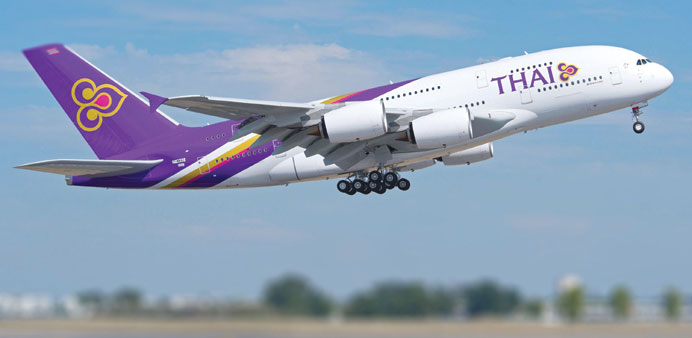Thailand’s new military rulers have singled out the country’s troubled flagship airline Thai Airways as the first state enterprise to undergo reform, an exercise that will test their unproven business acumen and ability to separate politics from business.
Reuters/Bangkok
Thailand’s new military rulers have singled out the country’s troubled flagship airline as the first state enterprise to undergo reform, an exercise that will test their unproven business acumen and ability to separate politics from business.
Thai Airways International has racked up four quarters of losses due to declining ticket sales, high operating costs and ruthless competition. Boardroom fights have also led to slow decision-making and a lack of coherent strategy, sources in the company say.
The junta led by General Prayuth Chan-ocha has told the chief of the Royal Thai Air Force to fix the airline. Air Chief Marshall Prajin Juntong, who also oversees economic matters for the military government, said on Friday a detailed restructuring plan aimed at returning the carrier to profit will be considered by the board at a meeting on July 24.
The success or failure of Prajin, who has little practical experience in running a business, will have wider implications for the government. The junta needs to assure foreign investors of its ability to manage the economy and that it is not out to merely weed out allies of previous prime ministers.
“You are right in noting that Prajin is a military man with little experience in running a company,” Monthon Satchukorn, a spokesman for the Thai Air Force and a Prajin aide, told Reuters in an interview.
“Prajin is a man whom he (the junta leader) can trust,” Monthon said.
Prajin, who declined to be interviewed for this report, will be chairing the upcoming meeting with a smaller board this week. Five members have resigned since the junta came to power, reducing the board to 10 members. Among the five who left was Ampon Kittiampon, who had been accused by the Thai Airways union of interfering with management and influencing executives whom he had close ties with. Ampon, who resigned as chairman in March but had remained on the board, has denied any wrongdoing.
Ampon was also the cabinet secretary under former Prime Minister Yingluck Shinawatra. Her government was overthrown by the junta in May following months of sometimes violent street protests aimed at ousting Yingluck.
The other four board members include Adul Sangsingkeow, the national police chief under Yingluck’s government.
Four of the five who left have links with former Prime Minister Thaksin Shinawatra, the elder brother of Yingluck, a source at the airline said, declining to be named because of the sensitivity of the matter.
Thaksin was removed in an earlier coup in 2006. A military-backed government later re-wrote the constitution to try to limit the political influence of the Shinawatra family.
The junta’s reshuffles within the civil service and its restructuring of the national police force – seen as a bastion of support for Thaksin - are part of efforts to dismantle his support base and ensure parties linked to him do not return to power, analysts say.
Prajin said the restructuring of Thai Airways will proceed in two phases, with the first focusing on boosting the efficiency of services and their quality. Cost-cutting will kick in during the second phase.
“We need to get rid of the excess fat for restructuring,” Prajin said after a board meeting on Friday. The carrier shoulders too many expenses, such as paying taxes for employees who started working for the airline before 2004, Piyasvasti Amranand, a former president of the airline, told Reuters.
“Thai Air has a malicious cancer inside the body,” Piyasvasti said. “It has to be cured from the inside.”

